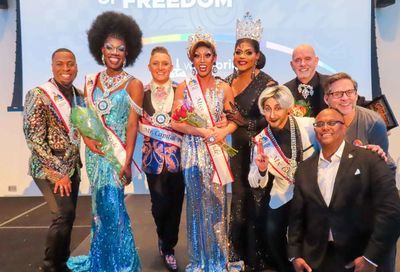Praiseworthy: Choir Boy (Review)
The real power of "Choir Boy" is in its subtle, graceful and evocative style of storytelling

Photo by Igor Dimitry
If only we could all be a little more like Pharus Jonathan Young, the lead character in Tarell McCraney’s Choir Boy, now in production at Studio Theatre.
We first meet Pharus as he sings his school’s anthem, “Trust and Obey.” He’s gleeful but poised, confident in his abilities to become the next Choir Lead at Charles R. Drew Preparatory School for Boys, an African-American school set in an unspecified, present-day location. (President Obama’s is one portrait hanging above designer Jason Sherwood’s warm, classically minded set, as if to suggest he’s an alumnus.)
Pharus’s poise is quickly ruined when the school bully, Bobby (an impressionistic Keith Antone), who is also Pharus’s main rival, rattles him mid-song with verbal taunts of “sissy” and “faggot-ass nigga.” Uncharacteristically, but also understandably, Pharus flinches, and in response the school’s Headmaster Marrow (a commanding Marty Austin Lamar) flinches too. Choir Boy chiefly centers on the headmaster’s growing concerns about whether Pharus is the right fit to lead his school’s celebrated choir. No question he’s the most talented as well as the most charismatic and lovable but maybe he’s just a little too lovable — too sweet, too soft, too sissy-like.
If you didn’t know any better, you’d be forgiven for thinking that McCraney wrote the part of Pharus for Jelani Alladin, so completely does the young actor in Studio’s production capture the essence of this sympathetic character. In Alladin’s hands, Pharus is slightly more flamboyant than even most gay choristers, but his vivacious personality and enthusiastic expressiveness are the opposite of a character flaw or sign of weakness. Instead, they’re the source of his strength, and fundamentally what drives him to succeed.
McCraney explores a lot of topics in his 95-minute, intermission-less play, chief among them the power of music — specifically, spirituals — to help people find inner-strength to carry on through pain and strife. Choir Boy uses music as if it were a musical, weaving it into the fabric of the story. Pharus and the four other boys we meet at Drew Prep School sing a lot throughout the show, both in the context of their day-to-day existence, rehearsing or performing with the choir, as well as to further the play’s character development and story exposition. Most notably, all of the music is gospel or at least gospel-inspired, and performed a cappella.
Director Kent Gash has corralled a strong group of young singing actors and helped them realize a way of breaking into song both naturally and spontaneously,, while remaining in sync with the narrative and in harmony with one another. In fact, the few times they don’t succeed usually works to enhance the play’s larger point about imperfect boys growing up in an imperfect world — and going to a school focused on nurturing the next generation of black leaders — who can’t possibly meet all the demands placed upon them.
For example, Pharus is consumed with the idea of leadership, repeatedly questioning if he has what it takes to be a leader. Is it enough for a leader to be respected, or does he have to be feared too, he wonders aloud. It’s a fair question. The genuinely nice and mostly magnanimous Pharus can only make a play for people’s respect; he doesn’t know — or doesn’t think he knows — how to make anyone fear him. He also doesn’t know how to love, and generally represses his sexual feelings — but one can only go so far, or so long, living like that, McCraney suggests.
There are a few tear-inducing moments in Choir Boy — a heartbreaking conversation when Pharus talks to his mother by phone or the way a couple of the boys subtly but surely (and only privately) show Pharus affection. There are also plenty of gentle laughs, through clever wordplay and a few choice cultural critiques. But the real power of the piece is in McCraney’s subtle, graceful and evocative style of storytelling. Heartstrings aren’t pulled in obviously manipulative ways, we’re not beaten on the head about the key themes or takeaways, and everything remains a little mysterious, more suggestive than definitive. As with life, in Choir Boy there are few clear or easy — or altogether happy — resolutions.
By play’s end, the bullied choir boy isn’t entirely victorious — and certainly not unscathed — in overcoming anti-gay adversity. And there’s just something satisfyingly realistic, particularly as seen through gay eyes, about the way Pharus’s experiences of being bullied, disrespected, misunderstood or rejected are shown to have subtly colored his life, and presumably will continue to do so. At the same time, they leave a theatergoer with few doubts about Pharus’s faith to carry on or his ability to look ahead, to make a future brighter than his past — to forgive his trespassers, if not forget what they did.
Choir Boy (![]()
![]()
![]()
![]() -1/2) runs to Feb. 22 at Studio Theatre, 14th & P Streets NW. Tickets are $44 to $88. Call 202-332-3300 or visit studiotheatre.org.
-1/2) runs to Feb. 22 at Studio Theatre, 14th & P Streets NW. Tickets are $44 to $88. Call 202-332-3300 or visit studiotheatre.org.
Support Metro Weekly’s Journalism
These are challenging times for news organizations. And yet it’s crucial we stay active and provide vital resources and information to both our local readers and the world. So won’t you please take a moment and consider supporting Metro Weekly with a membership? For as little as $5 a month, you can help ensure Metro Weekly magazine and MetroWeekly.com remain free, viable resources as we provide the best, most diverse, culturally-resonant LGBTQ coverage in both the D.C. region and around the world. Memberships come with exclusive perks and discounts, your own personal digital delivery of each week’s magazine (and an archive), access to our Member's Lounge when it launches this fall, and exclusive members-only items like Metro Weekly Membership Mugs and Tote Bags! Check out all our membership levels here and please join us today!





















You must be logged in to post a comment.